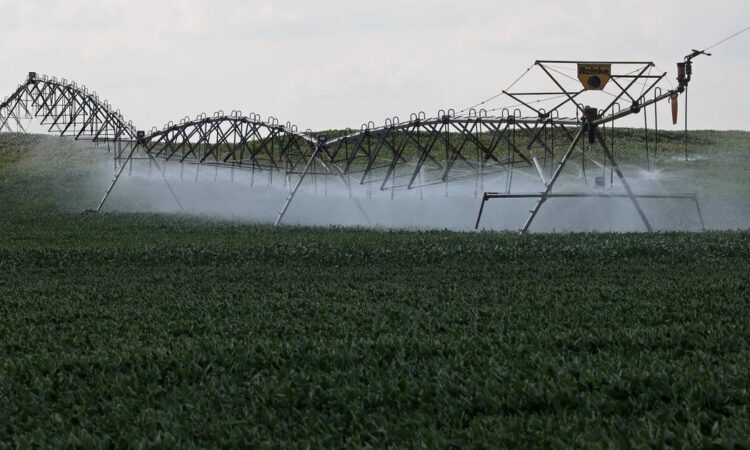
A group of Illinois small farmers are meeting with members of Congress on Thursday in Washington to discuss their hopes for “transformational investments” in the next farm bill, which governs policy in the agricultural sector.
As they see it, the new law could provide significant financial investment and protections that reduce economic inequality and racial injustice; build crop and human resilience to climate change and unpredictable weather; and improve access to nutritious food and sustainable, local systems. The previous farm bill expired in September.
“Nothing that we’re asking for is impossible or out of the ordinary at all,” said Natasha Nicholes, founder and executive director of the We Sow We Grow Project, an urban farm in Chicago’s West Pullman neighborhood.
The Illinois Stewardship Alliance and the Chicago Food Policy Action Council will be leading the trip to meet with the six Illinois members who serve on Agriculture Committees: Sen. Richard Durbin, and in the House, U.S. Rep. Jonathan Jackson, 1st,, Mike Bost,12th,, Nikki Budzinski,13th), Mary Miller, 15th and Eric Sorensen, 17th.
After purchasing a 4-acre plot in Galesburg in 2017 under the last farm bill, Demarkius Medley got a license to grow industrial hemp.
“I was probably the first in Knox County to do it,” said Medley, founder of Greenlords Pharms. “Definitely in town.”
He thinks he also might be the only Black farmer in Galesburg, possibly even in the county.
One of the proposed bills focuses on a key issue high up on his list: the Justice for Black Farmers Act. The agricultural landscape can sometimes be isolating — and unfair — for farmers of color, he explained.
While attending to his crops one early morning in 2019, police cars swarmed him after someone called in to say he was trespassing. One of the officers asked if he was growing marijuana.
“I can’t possibly be trespassing and growing at the same time,” he remembers saying. He told the officers it was industrial hemp and was able to show them his license. But the encounter didn’t sit right with him, and Medley posted on social media about it, attracting attention from local media.
Like Medley and Nicholes, most Black farmers are located in urban spaces. During the Great Migration, migrants from the South felt more welcome in northern cities than in rural communities; later, when agricultural mechanization increased, many found jobs outside the industry. Farmers of color eventually revived their traditions and began beautifying their urban neighborhoods with gardens.
:quality(70)/cloudfront-us-east-1.images.arcpublishing.com/tronc/43V6GHXPPBEGHE4QAK2BYGDMEQ.JPG)
But as recently as 2017, Black people operated about 35,000 out of 2 million farms across the country, according to the U.S. Department of Agriculture’s most recent census. And only 188 out of 72,651 farm owners in Illinois are Black. With a total acreage of 4.67 million, Black farm owners currently cultivate on 0.5% of 900 million acres of U.S. farmland.
Advocates hope the new bill will address historic racial and ethnic discrimination against Black people in farming assistance programs — such as the lack of equitable access to federal loans and grants — that continues to stymie their involvement in agriculture.
“Paperwork would stay on tables far past the time we had to apply,” Nicholes said. “My expectation is that they will do the right thing and make it where people can be served through agriculture in the proper way, and that we don’t make it where you have to do too many flips through hoops and everything.”
Medley recalls applying for federal assistance multiple times and being denied over and over again. After some time passed, the Department of Agriculture reached out to Medley and conducted an investigation into the staff who he had dealt with.
“It turns out they never even submitted any of my paperwork,” he said.
Daywatch
Weekdays
Start each day with Chicago Tribune editors’ top story picks, delivered to your inbox.
The bill includes policies that will also protect existing Black farmers from losing their land, offer land grants to a new generation of farmers and restore the land that farming families lost.
“When they weren’t able to pay back a loan at high interest rates or in a time frame that was given, their land would be taken from them,” Nicholes said. “So we want to make sure that all of this land that was previously farmed by Black individuals can start to be given back.”
But, she added, Chicago also has many empty lots — all full of possibilities — and the unique opportunity to convert them into urban farms that can connect communities with their food “in a way that most cities don’t.” Everybody deserves to be able to eat quality food that’s grown sustainably, Nicholes added.
[ Gregory Bratton tends to 100 community gardens. Now he’s fighting cancer and needs help. ]
“In Chicago, you’re not thinking, ‘Somebody’s out there growing my food for me,’” she said. “You’re thinking, ‘Let me put this order in on Instacart,’ or ‘Let me go to the grocery store and pick up this food that was probably grown hundreds of miles south from me and go and cook it.’ A lot of folks are so separated from the people who grow their food and it’s something that we’re trying to bridge.”
Nicholes and Medley are headed to the nation’s capital full of optimism that their experiences will be heard.
“I never thought I’d get to share my story on a national level,” Medley said. “And I somehow became an advocate, because of all the injustices. … I just wish I had more positive things to share. Maybe my story can help other farmers, maybe the government can step in.”
